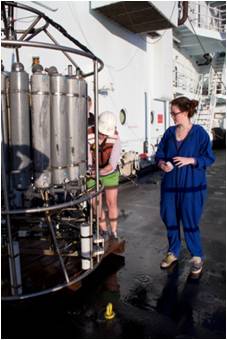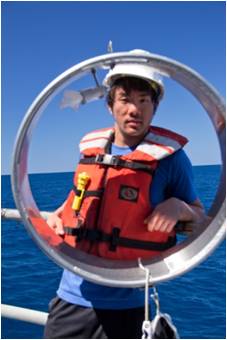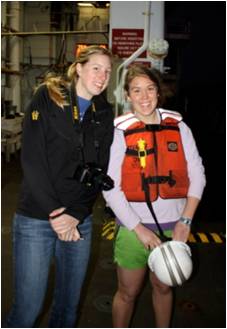
Design of Oceanographic Field Experiments



The UW School of Oceanography provides each of its undergraduate majors with the opportunity to conduct research and/or independent study on a topic of their choice and to write an undergraduate thesis formally presenting the results. Students typically complete their senior thesis by completing the two course sequence Ocean 443-444 in the winter and spring of their senior year. Motivated students can complete the thesis requirements through independent research outside of the formal thesis coursework - see the appendices to this document for the forms necessary to ‘opt-out’ of the traditional senior thesis courses.
For many students research is an experience with which they have little experience. Thus, it is often seen as a big hurdle and it can cause anxiety and worry. This guidebook is designed to clarify procedures, expectations and deadlines, explain options, provide resources, and reduce some of the anxiety.
Your thesis experience should prove to be one of the most rewarding parts of your oceanography education.
The goals of the senior thesis are:
1) To create a thesis proposal that is self-generated, written to departmental guidelines, and that undergoes at least two rounds of review by faculty and students in the School.
2) To perform independent research. If the research is conducted as part of a larger project, the individual’s research must have its own hypotheses or goals that are definable within the context of a larger research frame.
3) To provide opportunities for students to develop interpersonal skills and a sense of how individual research is conducted within a larger frame. The two examples of this used in 443/444 include group planning of the research cruise and peer-to-peer review of research proposals and reports.
4) To create a final report, separate from the initial project proposal, that is written wholly by the student. The final report is an opportunity for the student to explain how their research fits within the work of the larger oceanographic community. The final report will undergo both student and faculty review and will be made publicly available through the UW’s Digital Library (D-Space).
5) To present the results of the research in a public venue either through a poster presentation or an oral presentation. The senior thesis course 444 provides this opportunity via its spring symposium.
The primary function of Ocean 443 is to provide guidance for the formulation of your research proposals and for timely cruise planning of the Ocean 444 fieldwork that will take place from March 16th - Jan. 27th. The multi-faceted goal of Ocean 443 is to familiarize you with strategies and methods in field Oceanography, with thinking beyond the confines of your own option, with fitting into group efforts, with interpreting and presenting the resulting information, and, finally, with learning more about this year's field site, the eastern tropical north Pacifc off the Mexican coast. You will have principal responsibility for selecting a research topic/goal and then planning, executing, and reporting on your work. Experience tells us that you will enjoy this unique opportunity to develop your scientific skills in a real world framework.
The key to success in OCN 444 is solid preparation in OCN 443. Your major individual goals for fall quarter are:
1) To produce a detailed research proposal to test an hypothesis or explore an environment using the best possible experimental/observational strategy, given the limitations in time and available equipment.
2) To prepare to execute your proposed research at sea.
3) To assist in the cruise planning (schedule, logistics, etc.) for the ship that will be used.
The combination of background research, proposal writing, and cruise planning (OCN 443), the research cruise itself, paper writing, and the class symposium (OCN 444) is what makes this capstone course sequence such a unique, rewarding, and educational experience.
In OCN 443, each of you will be responsible for a written research proposal that lays out a scientific background and rationale, a cruise/analytical work plan, and a budget. Copies of some proposals from previous years are available from your advisers for short-term loan. To assist you in keeping on pace, additional assignments (Annotated Bibliography, Topic Summary, Proposal Outline) are designed to help you develop your library, organizational, and writing skills. Instructions for these assignments are on this web site and in the Course Guidelines. During winter quarter, you are expected to invest significant time reading relevant literature and your proposal should reflect this with a discussion of published work related to your study (including appropriate citations). You will assist, during formal class exercises, in formulating a detailed cruise plan for the ships and vessels that will be used and for ensuring that research vessel time is apportioned adequately and fairly. Prior to any cruise work, you will also be responsible for ordering necessary supplies and expendables, seeking out the equipment you need, and mastering necessary shipboard measurement techniques. Your grade in Ocean443 will be derived from the following components:
| Assignment | Grading | |
| Topic Summary | 5% | |
| Proposal Draft 1 | 10% | |
| Individual Ship Time Request | 5% | |
| Proposal Draft 2 | 20% | |
| Peer Review exercise | 15% | |
| Cruise Planning | 10% | |
| Final Proposal | 35% |
Due dates will be listed soon. Deductions of 2 points per day will be made for late submissions. A passing grade in OCN 443 and admission to OCN 444 are contingent upon submission of an acceptable proposal demonstrating that you are thoroughly prepared for the research cruise.
Last modified: 20 September 2012